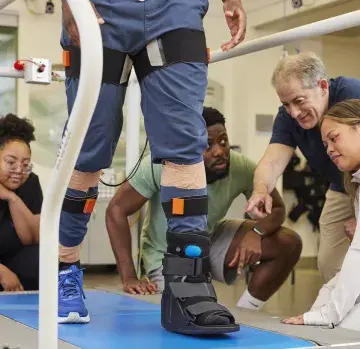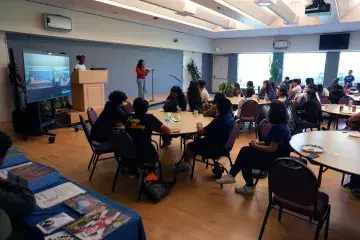SMU Named New West Coast Hub for “Hotspotting” Healthcare Model
Samuel Merritt University (SMU) has been chosen by the Camden Coalition as the West Coast hub for training students in how to practice a new model for treating patients with complex health and social needs that is designed to deliver higher-quality healthcare more cost effectively.
With philanthropic support from Sutter Health’s Better Health East Bay, SMU will kick off the initiative on Sept. 24 at its Oakland campus with a daylong “hotspotter” training program for interdisciplinary teams of students from nine universities across California.
Hotspotting makes strategic use of data to locate the most frequent users of emergency departments and then applies a personalized approach to better understand the medical, psychological and social barriers faced by the healthcare system’s sickest patients. The goal is to improve care for high-need patients while reducing repeated and expensive ED visits and hospital stays.
After initiating a pilot program last year, SMU was designated this month as one of four new student hotspotting hubs across the nation by the Camden Coalition of Healthcare Providers, a nonprofit organization that hopes to transform American healthcare by connecting the most difficult patients to effective interventions and support services they need to stay healthy.
“The hotspotting program perfectly aligns with SMU’s core values of collaboration, compassion and advancing health equity,” said SMU President Sharon Diaz. “It is truly an honor to help dozens of students from multiple universities learn how to work together and support people who have such incredibly complex health and social needs.”
In the U.S., 5 percent of the population accounts nearly half of total healthcare costs and 1 percent of the population accounts for 20 percent of national healthcare spending, according to Camden. Reasons vary for “super-users” of hospital services, from patients with chronic health problems to others who seek food, a warm bed or human contact. The hotspotting model aims to provide better care at a lower cost.
“We need to disrupt a healthcare system that isn’t meeting patients’ needs,” said Diaz.
The Camden Coalition was founded in 2002 by Dr. Jeffrey Brenner, a fierce critic of the poor outcomes and high costs for the most vulnerable patients in the U.S. healthcare system. In 2016, Camden launched the National Center for Complex Health and Social Needs to scale up its student hotspotting and other healthcare reform efforts.
Jim Hickman, president and CEO of Better Health East Bay who also sits on the national center’s advisory committee, said Brenner’s ideas helped to inspire the new direction of the Sutter Health philanthropic foundation in 2014. Since then, the group has been investing in the data-sharing technology to better identify and understand the region‘s most high-risk population and more effectively solve patients’ problems.
“The student hotspotting hub is an opportunity to train the next generation of healthcare providers,” said Hickman. “We’ve spent a lot of time in healthcare fitting people into the system. Now we have data and models to fit systems to the people.”
To help make that happen, Sutter Health will open the East Bay Advanced Care Clinic in October on the Oakland campus of the Alta Bates Summit Medical Center to better serve high-utilizers of health services by providing preventative care and case management. Some of the Bay Area student hotspotters will work in the clinic, located adjacent to the SMU campus.
More than 80 students studying in healthcare fields ranging from medicine and nursing to physical therapy and social work will attend the kick-off event on Sept. 24 at SMU in Oakland. The students will come from SMU, UC Berkeley, the UC Berkeley-UCSF Joint Medical Program, John F. Kennedy University, the California Northstate University College of Pharmacy, Sacramento State University, San Francisco State University, UCLA, and the USC School of Pharmacy.
Catherine Hickey, a hotspotting volunteer who is studying to become a physician assistant at SMU, said that as a former emergency medical technician in Oakland she witnessed firsthand how patients use emergency services for health problems that would be better handled in a primary care setting.
“Many patients have limited transportation, a lack of resources, and poor access to healthcare so that their only apparent choice is to use the emergency department,” said Hickey. “Through this program, I hope to become a better-informed provider about the resources and options available for my patients, and work to become a strong advocate for healthcare change.”
“We were pleased to select Samuel Merritt University as a student hotspotting hub because of SMU's strong partnerships within the community and its natural ability to convene stakeholders," said Marsha Johnson, director of Curriculum Integration at the National Center for Complex Health and Social Needs. "The school's dedication to diversity and the faculty's capacity to build consensus around integrated care will make it a valuable partner."
In addition to Samuel Merritt University, the other designated student hotspotting hubs are the University of Utah in Salt Lake City, the University of Southern Illinois, and Thomas Jefferson University in Philadelphia.


